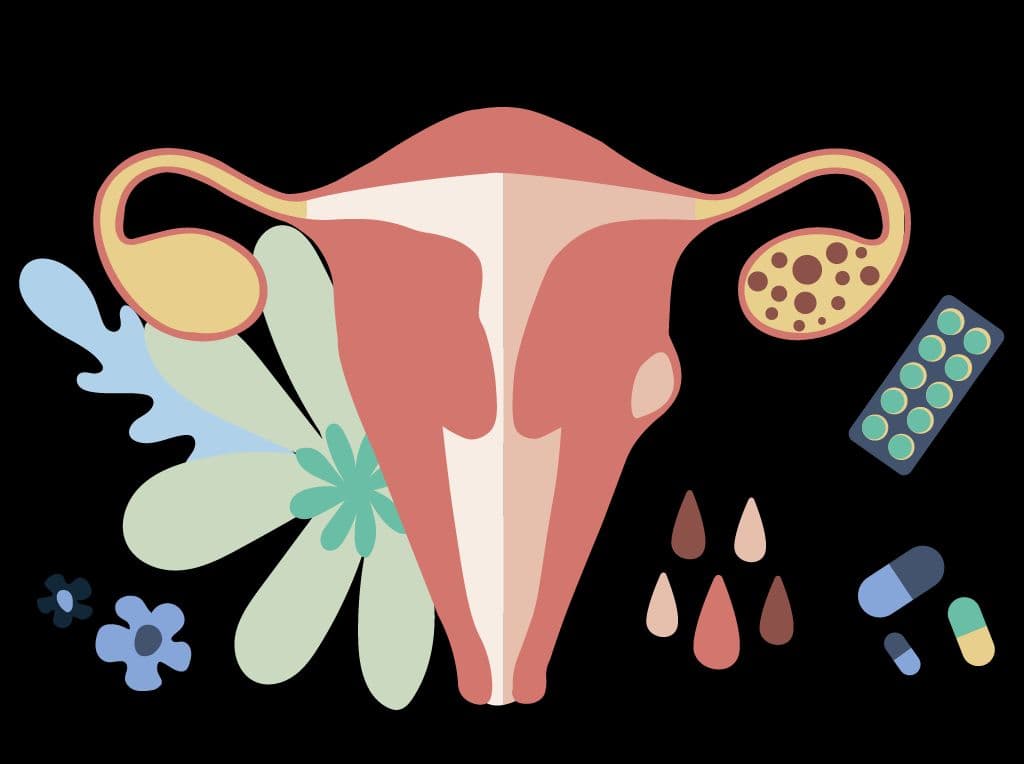This article is compiled by Sanjana Varma, a freelance writer at Proactive For Her.
Polycystic ovary syndrome (PCOS) is a hormone disorder that affects teenage girls and women. It is the most common endocrine disorder in women.
From the name” Polycystic Ovarian Syndrome”, we can understand that it involves the formation of cysts in the ovaries. However, the fact is, not all people with PCOS have cysts.
The underlying cause of PCOS is not well understood, but it is believed that an imbalance of sex hormones and insulin resistance are the main problems. This can cause symptoms and complications, such as excess facial and body hair, weight gain, irregular menstrual periods, infertility, increased risk of diabetes and heart disease.

Laboratory Tests
There is no specific lab test that will tell you if you have PCOS. These tests in conjunction with clinical history and Ultrasound findings will help your doctor to make a diagnosis of PCOS.
A few blood tests may be used to aid in the diagnosis of PCOS and other tests may be recommended once you have been diagnosed with PCOS.
Your doctor may suggest that you get these tests done periodically to see how you are doing disease wise and also detect the early onset of any complications such as heart disease, increased cholesterol, diabetes to name a few.
- DHEA/Testosterone test
What is it?
Dehydroepiandrosterone (DHEA) and testosterone belong to a class of hormones known as androgens (a.k.a. male hormones). They are responsible for secondary male sex characteristics and excess androgens are the cause of many of the symptoms of PCOS, including acne, hirsutism, female-pattern baldness, and menstrual irregularities.
Why is it relevant in PCOS?
Elevated male hormones are one of the criteria used to diagnose PCOS. But your androgens may not always be elevated on your labs and you could still have clinical symptoms such as acne or increased hair growth a.k.a hirsutism. Moreover, even a slight increase in testosterone in a woman’s body can suppress normal menstruation and ovulation.
- Prolactin test:
What is it?
Prolactin is a hormone that stimulates and sustains milk production in nursing mothers.
Why is it relevant in PCOS?
Prolactin levels are usually normal in non-pregnant, non-lactating women with PCOS. It is important to check for high prolactin levels to rule out other problems, such as a pituitary tumour, that might be causing PCOS like symptoms.
Elevated prolactin levels have the ability to stop ovulation and can cause symptoms similar to PCOS like irregular menstruation or total lack of menstruation.
However, some women with PCOS do have elevated prolactin levels that can worsen the irregularity of periods.
- Sex hormone-binding globulin (SHBG)
What is it?
Sex hormone-binding globulin (SHBG) is a protein that binds to both testosterone and estradiol. This is the hormone that is essentially carrying some of your sex hormones around as a carrier vehicle. The hormone attached to this vehicle is inactive or bound hormone and the free hormone is what causes any clinical symptoms.
If there is fewer carriers available, the amount of free or available hormone rises and that can cause some bothersome symptoms.
Why is it relevant in PCOS?
A patient may have normal testosterone, but a low SHBG and therefore have high bioavailable testosterone and may have signs/symptoms of androgen excess, such as hirsutism or acne.
SHBG is reduced in insulin resistance (which is usually the case in PCOS ) and a very good marker for insulin resistance.
Many women with polycystic ovarian syndrome have high-normal or even normal total testosterone but have a low SHBG because they have insulin resistance. Therefore, their bioavailable testosterone is often on the high side.
- Human chorionic gonadotropin (hCG)
What is it?
This test is done to identify and confirm a pregnancy.
Why is it relevant in PCOS?
One of the main reasons for the absence of periods or missed periods is pregnancy. The absence of periods can also be seen in PCOS. The hCG test helps to rule out the chances of pregnancy.
- Anti-Müllerian hormone (AMH)
What is it?
Anti-Müllerian hormone (AMH) is a type of hormone secreted by an ovarian follicle as it matures. AMH levels are an important diagnostic measure as they are directly associated with the number of antral follicles found on the ovary each month. Antral follicles are small fluid-filled sacs that contain immature eggs. In a normal ovary, AMH works by preventing the premature development of a follicle and, in turn, the release of an immature egg during ovulation. When AMH levels are too high, they can inadvertently put on the brakes on this process, halting the maturation of an egg midstream.
Why is it relevant in PCOS?
Women with PCOS will often have a high number of antral follicles and, as a result, an equally high level of AMH in their blood. A high level alone cannot diagnose PCOS since AMH levels typically decrease with age. Doctors will compare a woman’s age with the AMH results and use AMH values in association with the other tests to help make a diagnosis of PCOS.
- TSH
What is it?
TSH stands for thyroid-stimulating hormone, this hormone is produced by the thyroid gland. A TSH test is a blood test that measures this hormone. Thyroid hormones regulate the way your body uses energy. It also plays an important role in regulating your weight, body temperature, muscle strength, menstrual cycle and even your mood.
Why is it relevant?
Hypothyroidism is more common in people with PCOS than in the general population. Hypothyroidism is known to cause PCOS-like ovaries and overall worsening of PCOS and insulin resistance. So it is important to evaluate these hormones to ensure that any disturbances are treated which will also help alleviate PCOS symptomatically.
Since thyroid imbalances also bring with them symptoms such as hormonal weight gain, menstrual irregularities, hair fall, a low thyroid level may also be mistaken for PCOS. Getting a TSH level done allows us to diagnose PCOS more efficiently.
- Liver Function Tests
What is it?
Liver function tests are blood tests used to help diagnose and monitor liver disease or damage. The tests measure the levels of certain enzymes and proteins in your blood. These tests measure how well the liver is performing its normal functions of producing protein and clearing bilirubin, a blood waste product.
Why is it relevant?
Recent research has indicated that women with polycystic ovary syndrome (PCOS) are at increased risk for developing a disorder of the liver called NASH- nonalcoholic steatohepatitis, the onset of which can be detected by monitoring liver function tests. LFT would show persistently elevated liver enzymes in the case of NASH.
- Lipid Panel / Cholesterol Tests
What are they?
A lipid panel is a blood test that measures lipids (fats and fatty substances) used as a source of energy by your body. This would include parameters like total cholesterol, triglycerides, HDL(the good cholesterol), and LDL(the bad cholesterol).
Why is it relevant?
Lipid abnormalities, including elevated low-density lipoprotein (LDL), triglyceride levels and decreased high-density lipoprotein (HDL), are often found in women with PCOS. Obesity, insulin resistance and hyperandrogenism which coexist in PCOS have independent and interactive effects on dyslipidemia. Dyslipidemia is another word for an abnormally high level of lipids.
- Glucose test
What is it?
A blood sugar test measures the amount of sugar or glucose, in your blood. Your doctor may order this test to help diagnose diabetes. The amount of fasting insulin is determined to understand how insulin resistant someone is.
Why is it relevant?
Approximately 40% of women with PCOS develop diabetes so blood sugars must be monitored. Common tests recommended to do would include fasting blood sugar, oral glucose tolerance test, postprandial blood sugar and HbA1c
Vitamin D
There is an inverse relationship between vitamin D and metabolic risk factors such as insulin resistance, cholesterol, triglycerides, testosterone, and weight. There have been several studies that show that overweight women with PCOS who were vitamin D deficient, saw immense improvement after taking Vitamin D supplements. Their insulin, triglycerides, and cholesterol levels became better. Vitamin D deficiency has also been linked to depression. So ensure that you test your Vitamin D levels and maintain optimum levels.
Vitamin B 12
Vitamin B12 is a nutrient that helps keep the body's nerves and blood cells healthy. It helps make DNA, the genetic material in all cells. Some of the medications for PCOS can cause B12 deficiency so it is absolutely important for overall well being that your Vitamin B12 levels are adequate.
After Your Diagnosis
If you have PCOS to keep PCOS from getting worse and to reduce the risk of long-term chronic conditions, women with PCOS should aim to keep the following blood tests within normal ranges. To stay on top of your health, keep track of your blood results and compare changes with each new test.
Treatment
There is no cure for polycystic ovary syndrome (PCOS) and it does not go away on its own. Treatment of PCOS is primarily aimed at relieving symptoms and preventing complications. Your options depend on the type and severity of your symptoms and your desire to become pregnant. Talk to your healthcare practitioner about what options are best for you.
We can manage it!
A PCOS diagnosis might seem challenging both emotionally and physically, but with early diagnosis, treatment and lifestyle changes, you can have a healthy and fulfilling life. Yes! PCOS women can become pregnant albeit the path may be challenging. Treatment alone will not suffice, a good diet and exercise will help you keep your symptoms in check. Therefore, keep your chin up and your life will level up! Let’s tackle PCOS together!
Disclaimer - This information is educational and should not be construed as medical advice. Please consult your doctor before making any dietary changes or adding supplements.
Proactive for her is a digital clinic for women, offering accessible, personalised, and confidential healthcare solutions. We offer out-patient care, diagnostic services and programs for various health concerns of Indian women, across their lifetime - from puberty to pregnancy to menopause.

